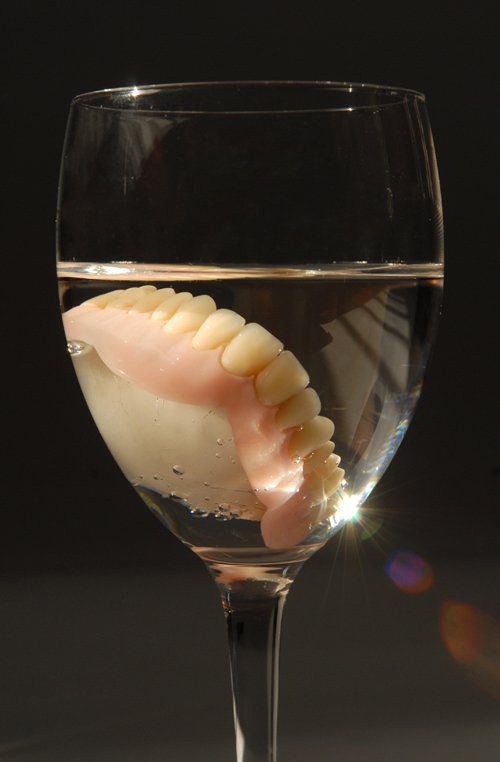The first thing about removable partial dentures is that, as the name implies, they don’t replace all of the teeth in your mouth. That’s a starting place, but there’s plenty more to understand. We’ve compiled a list of frequently asked questions regarding partial dentures and what you can expect if you suspect that you need them.

(Freeimages / Cienpies Design)
Who should consider partial dentures?
Depending on your circumstance, you may or may not be a good candidate for partial dentures. If you are missing adult teeth, either because they never grew in, fell out, or had to be removed, you might want to talk with your dentist about partial dentures. While they aren’t as natural-looking as dental implants, they are a cost-effective alternative that doesn’t require surgery.
What is the difference between partial and complete dentures?
The main difference between partial and complete dentures is that partial dentures replace only a few teeth in a row whereas complete dentures replace all of your teeth. Partial dentures are also usually held in place with special clasps that are anchored to existing teeth while complete dentures stay in place using suction created between the denture and gums. While both partial and complete dentures may require the use of denture adhesive, a well-made, properly fitting denture should stay in place on its own. If it is slipping around, clicking, or causing discomfort, head to your dentist for an adjustment.
What is the denture’s base made of?
Your denture’s base could be made of either a very thin metal or a colored resin. The metal is very durable and long-lasting, but it can cause some irritation for users who have metal allergies. The resin base is more cost-efficient, but it is also less durable than the metal base.
How long do I have to wait after tooth removal before I can wear my dentures?
Depending on your situation, you may be a good candidate for immediate dentures. Your dentist will take the appropriate molds before removing any teeth so that you can leave the office with a confident smile. You should note, however, that immediate dentures will probably need to be replaced with conventional dentures in the near future because your jaws and gums will change during the healing process. With conventional dentures, you wait to take the impression of your mouth until after the healing process has finished. This will allow your dentist to take a more accurate mold of your mouth so that the final product fits better for longer.
Can I eat with my partial dentures?
Yes, you may eat with your partial dentures, but it may take a little while to get used to them. You should start by eating soft foods that are cut into small pieces, but with practice, you can work your way up to just about anything. You should, however, stay away from very hard or sticky foods as well as chewing gum as they can damage the clasps or loosen your dentures over time.
How do I clean my partial dentures?
Your dentist will give you specific instructions based on your individual case, but there are some general rules of thumb where cleaning is concerned. Always use a soft-bristled toothbrush, and keep away from toothpaste and other household cleaners because they are too abrasive. Your dentist might suggest a special denture cleaner, but some people prefer using a mild hand soap to clean their dentures. You should brush your dentures at least once a day to help prevent stains, and soak them in a denture solution every night. This solution helps keep dentures soft so that they stay the right shape for your mouth. Depending on how big your partial denture is relative to your sink’s drain, you may want to cover the drain with a paper towel before you clean your dentures to stop them from accidentally falling down the drain.
A List of Do’s and Don’ts
To round out this article, we are going to end with a list of things you should and shouldn’t do with your partial dentures. If you have any questions or concerns about your partial dentures, don’t hesitate to ask your family dentist in Davis or Weber County.
Do
- Heed your dentist’s advice. This includes, but is not limited to, instructions on inserting, cleaning, and eating with your dentures.
- Be patient with yourself. Partial dentures take time to get used to, so be patient. You should, however, make sure to communicate with your dentist if you have pain or develop sores in a particular spot in your mouth. This could mean that you need your dentures adjusted.
- Practice eating and speaking by yourself until you are comfortable around others. Partial dentures will make both of these experiences easier and more enjoyable, but they can feel awkward at first. Talking can be more difficult than before, and you may notice that some words sound slurred at first, but don’t panic! Take a little bit of time to practice saying troublesome words aloud until you feel confident in your speech again.
Don’t
- Force the denture into place. If it’s causing pain or not going into the right position, don’t ever bite down to make it go where you want it to go. This could damage the attachment mechanism and cause you more discomfort.
- Be afraid to eat with your dentures in your mouth. In fact, chewing solid food often with and without your dentures will help your jaw and gums stay healthy, which will prevent bone resorption, a problem where the gums start to shrink away. Bone resorption can be painful and cause avoidable problems with your dentures.
